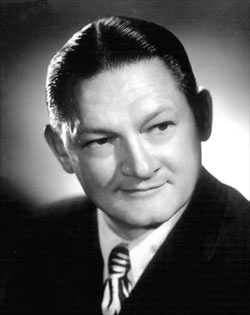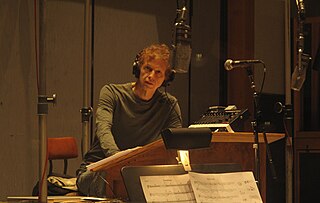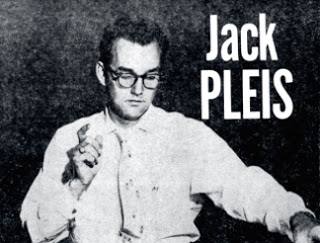
Walter Donaldson was a prolific American popular songwriter and publishing company founder, composing many hit songs of the 1910s to 1940s, that have become standards and form part of the Great American Songbook.

Albert Victor Young was an American composer, arranger, violinist and conductor. Young was posthumously awarded the Academy Award for Best Music Score of a Dramatic or Comedy Picture for Around the World in 80 Days at the 29th Academy Awards in 1957.

Sir John Milford Rutter is an English composer, conductor, editor, arranger, and record producer, mainly of choral music.
Gordon Hill Jenkins was an American arranger, composer, and pianist who was influential in popular music in the 1940s and 1950s. Jenkins worked with The Andrews Sisters, Johnny Cash, The Weavers, Frank Sinatra, Louis Armstrong, Judy Garland, Nat King Cole, Billie Holiday, Harry Nilsson, Peggy Lee and Ella Fitzgerald.

Nathaniel Shilkret was an American musician, composer, conductor and musical director.

Hans Hugo Harold Faltermeyer is a German musician, composer and record producer.
Arthur Greenslade was a British conductor and arranger for films and television, as well as for a number of performers. He was most musically active in the 1960s and 1970s.

"Beer Barrel Polka", originally in Czech "Škoda lásky", also known as "The Barrel Polka", "Roll Out the Barrel", or "Rosamunde", is a 1927 polka composed by Czech musician Jaromír Vejvoda. Lyrics were added in 1934, subsequently gaining worldwide popularity during World War II as a drinking song.
Royden Denslow Webb was an American film music composer. One of the charter members of ASCAP, Webb has hundreds of film music credits to his name, mainly with RKO Pictures. He is best known for film noir and horror film scores, in particular for the films of Val Lewton.

Buddy Feyne was an American lyricist during the swing era. He wrote the lyrics for "Tuxedo Junction", which went to No. 1 on the Billboard chart in 1940 when Glenn Miller recorded it, "Jersey Bounce", which was No. 15 on the Cash Box Hit Parade of 1942., and "Jumpin' with Symphony Sid".
Constantin Bakaleinikoff was a Russian-American composer.

John Altman is an English film composer, music arranger, orchestrator and conductor.

Robert Lamar Thompson was a composer, arranger, and orchestra leader from the 1950s through the 1980s. Active in Los Angeles, Thompson was a recording artist for RCA Victor and Dot Records, scored film and television soundtracks, and wrote musical accompaniments for commercials. He composed, arranged, and conducted the orchestra for such wide-ranging artists as Rosemary Clooney, Mae West, Julie London, Bing Crosby, The Andrews Sisters, Chet Atkins, Duane Eddy, Judy Garland, Jerry Lewis, and Phil Ochs.

Joseph Trapanese is an American composer, arranger, and producer. He works in the production of music for films, television, records, theater, concerts, and interactive media.

David Richard Campbell is a Canadian-American arranger, composer, and conductor. He has composed and arranged music for many films, including North Country (2005), Brokeback Mountain (2005), August: Osage County (2013), Annie (2014), Foxcatcher (2014), Rock of Ages (2012), Dreamgirls (2006), and Joy (2015). He has also worked on over 450 gold and platinum albums by artists of a wide range of genres, including The Rolling Stones, Neil Diamond, Metallica, Radiohead, Evanescence, Rush, Beyoncé, Muse, Michael Jackson, Aaliyah, Ariana Grande, Harry Styles, Aerosmith, Juanes, Garth Brooks, and various albums by his son Beck.
Victor Clarence Schoen was an American bandleader, arranger, and composer whose career spanned from the 1930s until his death in 2000. He furnished music for some of the most successful persons in show business including Benny Goodman, Glenn Miller, Count Basie, Tommy Dorsey, Harry James, Les Brown, Woody Herman, Gene Krupa, George Shearing, Jimmie Lunceford, Ray McKinley, Benny Carter, Louis Prima, Russ Morgan, Guy Lombardo, Carmen Cavallaro, Carmen Miranda, Gordon Jenkins, Joe Venuti, Victor Young, Arthur Fiedler and the Boston Pops, and his own The Vic Schoen Orchestra.

Jack K. Pleis was an American jazz pianist, arranger, conductor, composer and producer. He recorded on London and Decca Records in the 1950s, and Columbia Records in the 1960s. During the course of his career, Pleis worked with many artists, including Louis Armstrong, Harry Belafonte, Bing Crosby, Sammy Davis Jr., Benny Goodman, Earl Grant, Brenda Lee, and Joe Williams. Between 1950 and 1976, more than 150 songs were arranged by Pleis. His surname is pronounced "Pleece".
Virginia Nelson, professionally known as Ginny Gibson, was a prolific New York recording vocalist. Gibson recorded jingles and popular songs. Her married surname, beginning around 1946, was Nelson. In 1958, she married Richard Dennis Criger (1925–2001). She divorced Criger in 1976. Gibson also recorded under the alias "Ginny Blue."
Kelly Gordon was an American singer, songwriter and record producer.
Rolande Maxwell Young Schrade was born in Washington, D.C. She was an American composer, pianist, teacher, and the matriarch of a musical family with five children. After studying at Catholic University, she became a pupil of Harold Bauer at the Manhattan School of Music, and of Vittorio Giannini at the Juilliard School. In 1949, she married Robert Warren Schrade, an internationally-known concert pianist and faculty member at the Manhattan School of Music.











